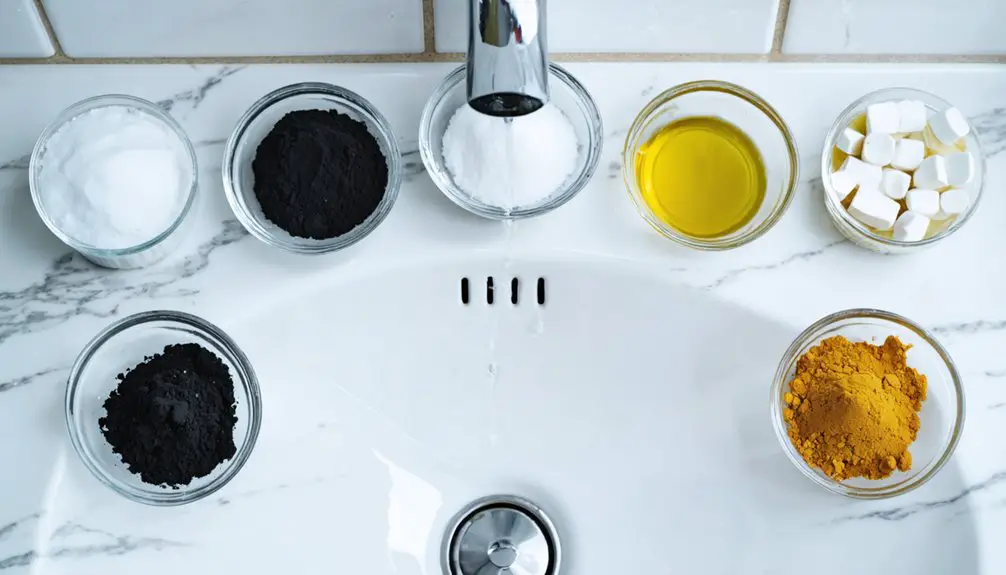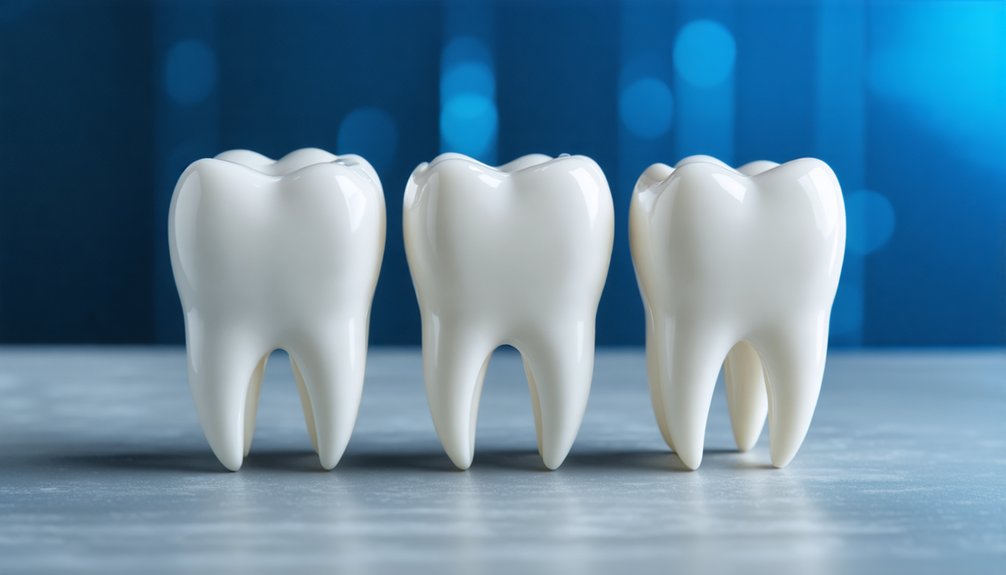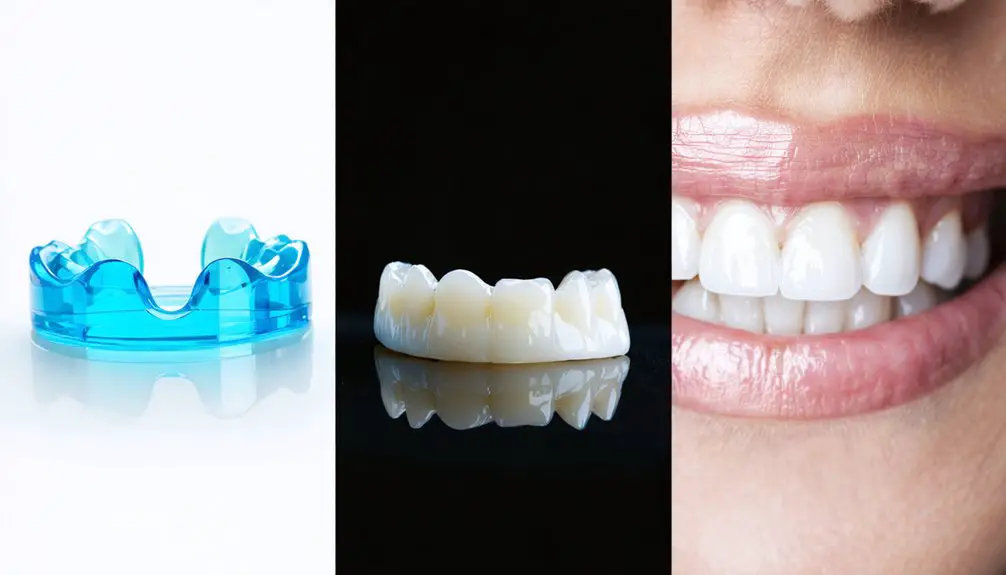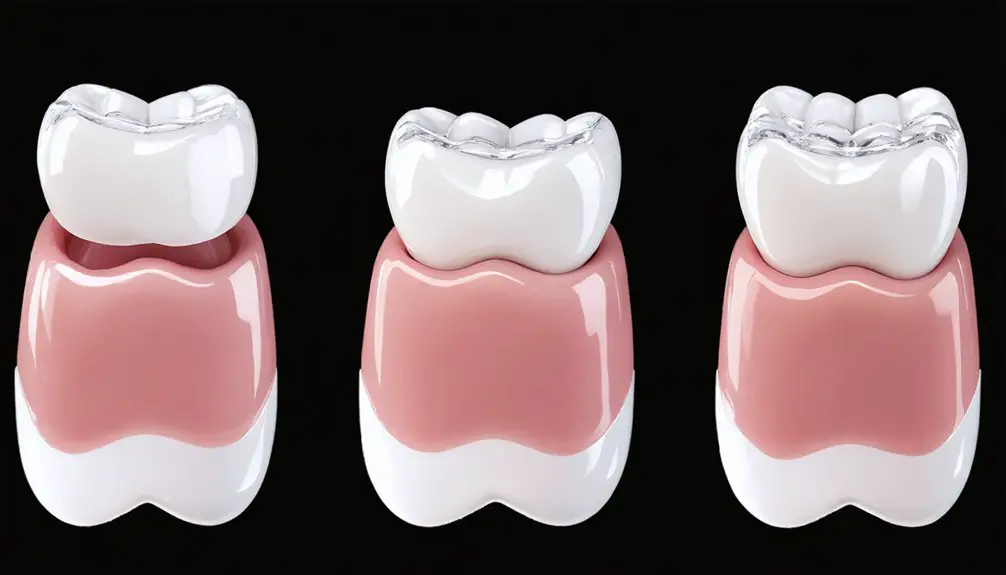You’ve got several effective options to address genetic tooth discoloration, from professional in-office treatments to custom take-home systems. Consider professional laser whitening for immediate results, or opt for custom-fitted trays with professional-grade gel for at-home use. Dental veneers can provide a permanent solution for severe cases, while minimal-prep bonding offers a conservative approach. Daily care strategies and dietary adjustments help maintain results, and natural remedies can supplement your chosen treatment. Discover which combination of these solutions will work best for your unique situation.
Key Takeaways
- Professional laser whitening treatments provide immediate results and can effectively address genetic discoloration through controlled, deep bleaching protocols.
- Custom-fitted take-home whitening trays with professional-grade gel offer targeted treatment for genetic staining while minimizing sensitivity.
- Porcelain veneers permanently mask severe genetic discoloration and resist future staining, providing a long-lasting solution.
- Minimal-prep bonding provides a conservative approach to covering genetic discoloration while preserving natural tooth structure.
- Consistent preventive care, including specialized whitening toothpaste and professional cleanings, helps maintain results and prevent further discoloration.
Understanding Your Genetic Tooth Discoloration
While many people assume tooth discoloration stems purely from lifestyle habits, genetics play a significant role in determining your tooth color and structure.
You may inherit conditions like dentinogenesis imperfecta or amelogenesis imperfecta, which affect both your baby and permanent teeth’s appearance and strength.
People with these genetic conditions often develop grayish, transparent enamel that requires professional intervention.
Your genetic factors influence the thickness and translucency of your enamel, as well as the color of your underlying dentin. Tooth shade variations can be traced back to melanocytes in the tooth pulp.
If you’ve inherited thinner enamel, you’ll naturally show more of the yellowish dentin beneath.
Unlike surface stains from coffee or tobacco, genetic tooth discoloration occurs inside your teeth, making it more challenging to treat.
Understanding these inherited traits helps explain why traditional whitening methods mightn’t work as effectively for you, and why you’ll need specialized approaches for addressing your unique tooth structure.
Professional In-Office Whitening Solutions
For those seeking solutions beyond genetic tooth discoloration, professional in-office whitening treatments offer powerful, immediate results under expert supervision.
You’ll find advanced options like laser whitening and LED whitening that can transform your smile in just 60-90 minutes, with effects that surpass at-home alternatives. Pre-treatment diagnostic assessments evaluate your oral health to ensure safe and suitable whitening options.
- Laser whitening accelerates the bleaching process by precisely targeting chemical bonds in stains, while protecting surrounding gum tissue.
- LED-activated treatments use cool blue light with adjustable wavelengths to maximize comfort and effectiveness while minimizing sensitivity.
- Deep bleaching protocols combine in-office sessions with custom-fitted trays for stubborn genetic stains, particularly effective against tetracycline discoloration.
Your dentist will prepare your teeth with protective measures and carefully control dosing to guarantee ideal results while minimizing potential side effects. These treatments can lighten teeth up to eight shades whiter with results lasting up to a year-and-a-half.
Custom Take-Home Whitening Systems
Custom take-home whitening systems represent a professional-grade solution that combines clinical efficacy with convenient at-home application.
You’ll receive precisely fitted trays created from professional dental molds, ensuring ideal gel distribution and gum protection. These custom tray benefits include reusability for touch-ups and superior comfort during treatment. Digital scanning technology creates highly accurate impressions for optimal tray fit. Results from dentist-prescribed take-home systems outperform over-the-counter options significantly.
Your dentist will provide professional-strength whitening gel containing 10-22% carbamide peroxide, carefully selected to match your sensitivity levels and whitening goals.
The gel’s thicker consistency maintains better contact with your teeth than over-the-counter alternatives, enhancing whitening gel effectiveness.
You’ll follow a tailored treatment protocol spanning several weeks, with results appearing gradually. This controlled approach minimizes sensitivity while delivering more predictable outcomes than mass-market options, supported by professional guidance throughout your whitening journey.
Dental Veneers and Bonding Options
Dental veneers represent one of the most transformative solutions for treating persistent tooth discoloration, especially in cases where traditional whitening methods prove insufficient. These ultra-thin coverings provide a durable solution for various types of stains.
Through advanced veneer customization, you’ll achieve natural-looking results that perfectly match your smile’s aesthetics while effectively masking both internal and external stains. With proper maintenance and care, veneers can last 10-15 years before requiring replacement.
Modern bonding techniques guarantee your veneers will provide lasting results, with survival rates exceeding 95% after five years.
Here’s what you can expect:
- Minimal enamel removal preserves your natural tooth structure while allowing for proper veneer placement
- Custom shade matching creates a uniformly bright smile tailored to your preferences
- Porcelain veneers resist future staining from foods and drinks, maintaining their brightness longer than other whitening treatments
Daily Care Strategies for Discolored Teeth
While veneers offer remarkable results for severe discoloration, maintaining your teeth’s natural brightness begins with proper daily care routines.
Your home care regimen should include brushing twice daily for two minutes using whitening toothpaste and an electric toothbrush for ideal stain removal. Addressing vitamin deficiency issues through proper nutrition can help prevent further discoloration. Don’t forget to floss daily and use an antibacterial mouthwash to combat plaque buildup.
Dark berries and coffee can severely stain teeth, so minimize consumption of these beverages and foods. For effective stain prevention, you’ll want to minimize exposure to dark beverages by using a straw and rinsing with water immediately after consumption.
Include crunchy vegetables in your diet to help naturally clean tooth surfaces. When using whitening products, always follow manufacturer guidelines carefully and discontinue use if sensitivity occurs.
Remember to replace your toothbrush every three months to maintain cleaning efficiency and schedule professional cleanings twice yearly.
Natural Remedies and Preventive Measures
For those seeking gentler alternatives to chemical treatments, natural remedies offer promising options for addressing tooth discoloration.
Natural acids found in strawberries combined with baking soda create an effective whitening paste, while oil pulling with coconut or sesame oil may help reduce bacteria and plaque buildup that contribute to yellowing.
- Try mixing crushed strawberries with baking soda for a gentle whitening paste, but limit use to once weekly to protect your enamel.
- Practice oil pulling for 10-30 minutes daily using pure coconut or sesame oil to improve oral hygiene.
- Incorporate mineral-rich foods like nuts and seeds into your diet while avoiding staining substances like coffee, tea, and red wine.
Remember that natural remedies work best on surface stains and require consistent application for noticeable results.
Advanced Cosmetic Treatment Alternatives
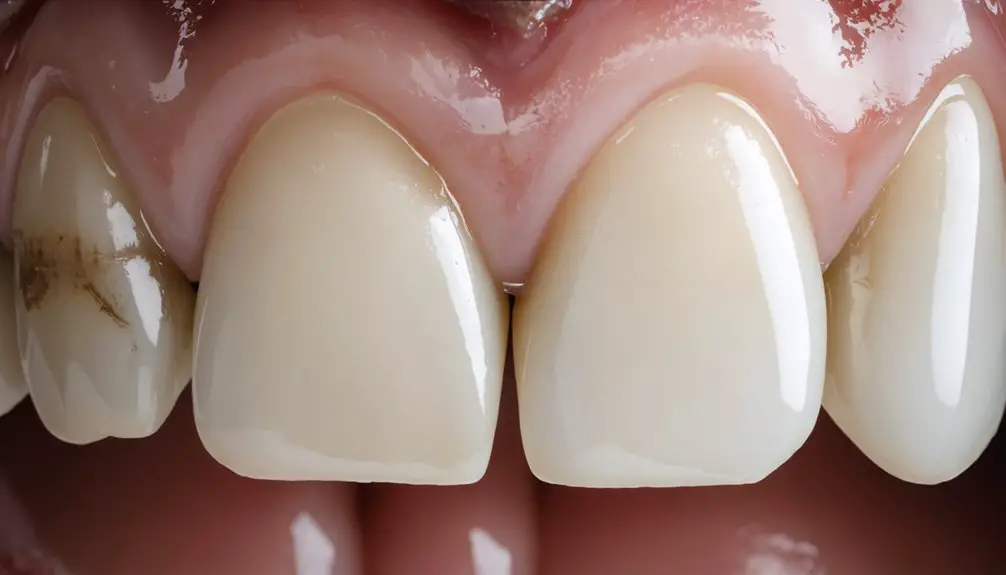
If you’re seeking long-lasting solutions for tooth discoloration, porcelain veneers offer a transformative option by covering the front surface of your teeth with custom-crafted, stain-resistant shells.
You’ll find that minimal-prep bonding provides a more conservative approach, using tooth-colored resin to mask mild discoloration while preserving your natural tooth structure.
Both treatments can dramatically enhance your smile‘s appearance, with veneers lasting up to 15 years and bonding serving as an excellent intermediate solution for less severe cases.
Porcelain Veneer Treatment Options
When traditional whitening methods fall short, porcelain veneers offer an advanced solution for severe tooth discoloration. These custom-made ceramic shells are bonded to your teeth’s front surface, effectively masking intrinsic stains while preserving natural tooth structure.
Veneer materials combine excellent biocompatibility with superior aesthetic customization, allowing for precise shade matching and lifelike translucency.
Your treatment options include:
- Conventional feldspathic porcelain veneers for severe tetracycline staining
- Translucent veneers with opaque composite underlayers for intense discoloration
- Combined approaches using internal bleaching and veneers for endodontically treated teeth
You’ll benefit from porcelain veneers’ durability and stain resistance, making them ideal for treating genetic defects, medication-related staining, and enamel hypoplasia.
Their versatility extends beyond color correction, allowing for shape modification and gap closure while maintaining a natural appearance.
Minimal-Prep Bonding Solutions
Minimal-prep bonding presents a conservative yet effective solution for treating genetic tooth discoloration while preserving your natural enamel structure.
During this single-visit procedure, your dentist will lightly roughen the tooth surface and apply a conditioning agent to enhance resin adhesion. They’ll then carefully select and sculpt composite resin to match your natural tooth shade.
The process requires minimal preparation and typically takes 30-60 minutes without the need for anesthesia. You’ll enjoy immediate results that can last 3-10 years with proper care.
While the bonding material may be less durable than porcelain veneers, it offers an affordable option that can simultaneously address other cosmetic concerns like chips or gaps.
To maintain your results, you’ll need to avoid hard foods and maintain excellent oral hygiene habits.
Frequently Asked Questions
Can Genetic Tooth Discoloration Skip Generations in Families?
Picture your dental drama playing hopscotch through time – yes, your genetic tooth discoloration can absolutely skip generations through various inheritance patterns, surprising unsuspecting family members like an ancestral practical joke.
At What Age Should Children With Genetic Discoloration Begin Professional Treatments?
You’ll want to wait until age 12-14 before starting professional whitening treatments. Early intervention should begin with your pediatric dentist’s assessment, who’ll determine appropriate treatment options for your child’s specific case.
Does Pregnancy Affect Genetic Tooth Discoloration Treatment Options?
You’ll need to postpone genetic tooth discoloration treatments during pregnancy, as pregnancy hormones can increase sensitivity and dental safety concerns make whitening procedures risky for both you and your developing baby.
Are There Specific Genetic Tests Available to Predict Tooth Discoloration?
While you can get genetic testing for enamel defects, there aren’t widely available commercial tests specifically for predicting tooth discoloration. Current testing mainly confirms existing conditions through specialized genetic clinics.
Can Orthodontic Treatment Worsen Genetic Tooth Discoloration?
Particularly potent orthodontic impact can worsen your genetic tooth discoloration severity, especially if you’ve got fragile enamel or dentin. You’ll need careful monitoring and gentler forces during treatment.
References
- https://www.airportroaddental.com/tooth-discoloration-causes-types-and-treatment
- https://www.salinasdental.com/blog/can-discolored-and-stained-teeth-be-hereditary/
- https://www.perfectsmiles.net/2024/06/17/genetics-and-discolored-teeth/
- https://www.webmd.com/oral-health/tooth-discoloration
- https://citydentalnyc.com/tooth-discoloration-causes-treatment/
- https://www.deandentalcare.com/blog/2021/08/12/stained-teeth-genetics/
- https://the-smile-bar.co.za/the-role-of-genetics-in-teeth-discoloration/
- https://www.beverlyfarmsdental.com/blog/2022/06/15/can-genetics-cause-stained-teeth/
- https://medlineplus.gov/genetics/condition/dentinogenesis-imperfecta/
- https://www.arthurglosmandds.com/blog/different-methods-of-teeth-whitening/
